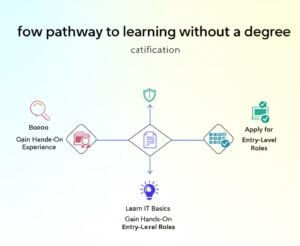The cybersecurity industry is booming, with demand far outpacing supply. According to reports, there are millions of unfilled cybersecurity jobs globally, creating opportunities for individuals from diverse backgrounds. One common misconception is that a degree in computer science or a related field is mandatory to enter this field. However, many successful professionals have proven that it’s entirely possible to start a cybersecurity career without a degree. By focusing on skills, certifications, and hands-on experience, you can carve out a rewarding career in this dynamic and high-demand industry.
In this article, we’ll explore how to kickstart your cybersecurity journey without formal education, provide actionable steps, and answer frequently asked questions to guide you along the way.
1. Develop Foundational Knowledge
Before diving into cybersecurity, it’s essential to build a strong foundation in IT and networking. Cybersecurity is built on these fundamentals, so understanding them is crucial for long-term success.
- Learn IT Basics : Familiarize yourself with operating systems (Windows, Linux), networking concepts (TCP/IP, DNS, firewalls), and system administration. These skills form the backbone of cybersecurity.
- Study Cybersecurity Concepts : Dive into topics like encryption, authentication, threat detection, incident response, and ethical hacking. Understanding these concepts will prepare you for real-world scenarios.
- Resources :
- Online Platforms : Websites like Coursera, edX, Udemy, and Cybrary offer affordable courses tailored to beginners.
- Books : The Web Application Hacker’s Handbook and CompTIA Security+ Study Guide are excellent resources for foundational knowledge.
- YouTube Channels and Blogs : Follow creators like NetworkChuck, John Hammond, and blogs like Krebs on Security for practical insights.
By mastering the basics, you’ll be better equipped to tackle advanced topics and transition into specialized areas of cybersecurity.
2. Gain Hands-On Experience
Cybersecurity is a hands-on field, and practical experience is highly valued by employers. Here’s how you can gain real-world skills:
- Set Up a Home Lab : Use virtualization tools like VirtualBox or VMware to simulate networks and practice setting up servers, testing vulnerabilities, and simulating attacks. This is an excellent way to experiment without risking real systems.
- Participate in CTF Challenges : Capture the Flag (CTF) competitions are a fun and effective way to sharpen your skills. Platforms like Hack The Box, TryHackMe, and CTFtime offer challenges that mimic real-world cybersecurity scenarios.
- Contribute to Open Source Projects : Platforms like GitHub host open-source security tools where you can contribute code, documentation, or bug fixes. This not only builds your portfolio but also connects you with the cybersecurity community.
- Start in IT Roles : Entry-level IT jobs like help desk support, network administration, or system administration can serve as stepping stones into cybersecurity. These roles provide valuable experience and exposure to IT systems.
Hands-on experience demonstrates to employers that you can apply theoretical knowledge to real-world problems, making you a more attractive candidate.
3. Earn Industry-Recognized Certifications
Certifications play a critical role in validating your skills and knowledge, especially if you lack a formal degree. They signal to employers that you possess the expertise required for specific roles. Below are some popular certifications categorized by skill level:
These certifications not only enhance your resume but also provide structured learning paths to deepen your expertise.
4. Build a Professional Network
Networking is a powerful tool in any industry, and cybersecurity is no exception. Building connections can open doors to job opportunities, mentorship, and collaborations.
- Join Online Communities : Participate in forums like Reddit’s r/cybersecurity, Stack Exchange, or specialized LinkedIn groups. Engage in discussions, ask questions, and share your knowledge.
- Attend Conferences and Meetups : Events like DEF CON, Black Hat, and local meetups allow you to learn from experts and connect with peers. These events often feature workshops, keynote speeches, and networking sessions.
- Engage on Social Media : Follow cybersecurity professionals and organizations on platforms like Twitter and LinkedIn. Share insights, comment on posts, and stay updated on industry trends.
A strong network can provide guidance, support, and opportunities throughout your career.

5. Create a Strong Portfolio
In cybersecurity, actions speak louder than words. A well-crafted portfolio showcases your skills and achievements, making you stand out to potential employers.
- Document Your Projects : Highlight projects you’ve worked on, such as penetration tests, vulnerability assessments, or contributions to open-source tools.
- Write Blog Posts or Create Videos : Share your knowledge by writing articles or creating videos explaining cybersecurity concepts or walkthroughs of CTF challenges.
- Share Your Work Online : Use platforms like GitHub or personal websites to display your projects and accomplishments. This demonstrates your ability to solve real-world problems.
A strong portfolio not only proves your capabilities but also establishes you as a thought leader in the field.
6. Apply for Entry-Level Cybersecurity Roles
Once you’ve built your skills and credentials, it’s time to start applying for jobs. Look for entry-level roles that align with your expertise, such as:
- Security Analyst
- Junior Penetration Tester
- SOC Analyst
- IT Security Specialist
- Incident Responder
Tailor your resume to highlight relevant skills, certifications, and hands-on experience. Emphasize problem-solving abilities and a passion for cybersecurity. Even if you don’t meet all the qualifications, apply anyway—many employers value potential and willingness to learn.
7. Stay Updated and Keep Learning
Cybersecurity is a rapidly evolving field, and staying informed is crucial for long-term success. Here’s how to stay ahead:
- Read Industry News : Follow sources like Krebs on Security, Dark Reading, and Threatpost for the latest updates on threats, tools, and technologies.
- Take Advanced Courses : As you progress, consider earning higher-level certifications like CISSP, CISM, or OSCP to deepen your expertise.
- Experiment with New Tools : Continuously test new tools and techniques in your home lab to stay sharp and adapt to emerging trends.
Continuous learning ensures you remain competitive and capable of addressing new challenges.
Conclusion
Starting a cybersecurity career without a degree is not only possible but increasingly common. Employers value practical skills, certifications, and hands-on experience over formal education. By focusing on foundational knowledge, gaining real-world experience, earning certifications, and building a strong professional network, you can successfully enter and thrive in this dynamic field.
Remember, cybersecurity is a journey, not a destination. Stay curious, keep learning, and embrace challenges as opportunities to grow. With dedication and persistence, you can achieve a rewarding career in cybersecurity without a traditional degree.
FAQs
1. Can I get a cybersecurity job without any prior IT experience?
Yes, but it may take more effort. Start by learning IT basics, earning entry-level certifications (e.g., CompTIA Security+), and gaining hands-on experience through labs or internships.
2. What are the best certifications for beginners in cybersecurity?
Beginner-friendly certifications include CompTIA Security+, Cisco Certified CyberOps Associate, and GIAC Security Essentials (GSEC).
3. How long does it take to start a cybersecurity career without a degree?
The timeline varies depending on your dedication and learning pace. With consistent effort, you can gain the necessary skills and certifications within 6 months to 2 years.
4. Do employers care more about certifications or degrees?
While degrees are valued, many employers prioritize certifications and hands-on experience. Certifications like CompTIA Security+ or CEH demonstrate specific skills applicable to cybersecurity roles.
5. Is self-study enough to succeed in cybersecurity?
Self-study can be sufficient if combined with hands-on practice, certifications, and networking. However, structured learning (e.g., online courses) can provide a more comprehensive foundation.



